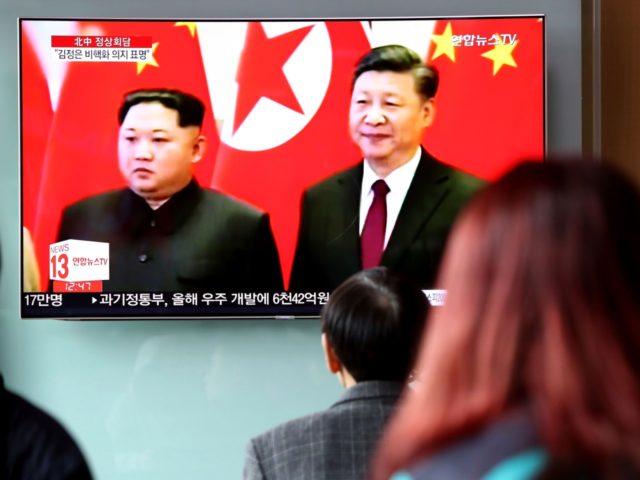Chinese Communist Party leader Xi Jinping penned an opinion piece published on the front page of North Korea’s state newspaper Rodong Sinmun on Wednesday in anticipation for his arrival there this week, vowing “unswervable support” to dictator Kim Jong-un.
Xi will arrive in Pyongyang on Thursday for a two-day visit overtly intended to observe the 70th anniversary of the two countries establishing diplomatic relations. The meeting will precede an anticipated in-person discussion between Xi and American President Donald Trump at the upcoming G-20 summit in Japan. Trump said on Tuesday he is expecting an “extended meeting” with Xi to discuss, among other things, their ongoing trade dispute and international diplomacy.
Rodong Sinmun has yet to publish Xi’s column on its English language page, but the Chinese state-run Global Times newspaper published highlights early Wednesday.
“China will unswervingly support Chairman Kim in leading the DPRK [North Korea] to implement the new strategic line and focus on developing economy and improving people’s livelihood for new and greater achievements in the socialist construction of the DPRK,” the Global Times quoted Xi as saying. “We are pleased to see that with Chairman Kim’s correct decision and the concerted efforts of all parties concerned, the general trend of peaceful dialogue on the Korean Peninsula has taken shape, and a political settlement to the Peninsula issue sees a rare historical opportunity.”
Xi appears to be referring to the world’s ongoing demands for North Korea to cease its illegal nuclear weapons development with the term “the Peninsula issue.” Kim Jong-un has said he is in favor of “denuclearization” of the peninsula – and claimed it was father Kim Jong-il’s “dying wish” – but his regime routinely redefines “denuclearization” to mean the expulsion of U.S. assets from the country, as America is a nuclear power.
Xi’s column did not mention denuclearization but, instead, an end to conflict in Korea, which some may interpret as a call for the world to stop fighting North Korea’s nuclear development rather than for North Korea to comply with globally accepted international legal principles.
“It fits our respective need for development and the common interests of our peoples to push forward the political settlement of the Korean Peninsula issue and maintain peace and stability in the region,” Xi wrote in his column, adding that China would “actively contribute to regional peace, stability, development and prosperity by strengthening communication and coordination with the DPRK and relevant parties to jointly push for progress in talks and negotiations on the issue.”
Xi’s column made the front page of Wednesday’s edition of Rodong Sinmun. Xi often writes such pieces and publishes them in local media before arriving on a foreign visit. His work appeared under news of Kim Jong-un receiving an unspecified “top honor” from a city in socialist Venezuela, a close ally of Pyongyang’s.
Rodong Sinmun rarely allows for guest authors but, when it does, they are often Chinese. South Korea’s Yonhap news agency noted on Wednesday that Xi’s predecessors in the office of the Chinese presidency – one of several titles Xi holds in the country – Jiang Zemin and Hu Jintao also wrote stories the state newspaper published before visiting the country.
Xi’s will be the first Chinese head of state’s visit to North Korea in 14 years, following four state visits by Kim to China in the past two years. Kim had not left North Korea as head of state until visiting Beijing in early 2018.
The Chinese Foreign Ministry said in its regular briefing Wednesday that it hopes Xi can help bring Trump back to the negotiating table with Kim. Kim and Trump last met in Hanoi, Vietnam, in February, for talks that Washington believed were intended to discuss denuclearization. Instead, according to insiders, Kim wanted Trump to formally recognize North Korea as a nuclear power and send “famous basketball players” to Pyongyang. Trump abruptly walked out of the summit halfway through, stating that Kim’s negotiators wanted Trump to lift international sanctions on North Korea without ending the country’s nuclear program, a deal he rejected.
Xi did not mention sanctions in his column on Wednesday. China, which as a policy opposes national sanctions from one country to another, supported United Nations sanctions on Pyongyang in the aftermath of its latest nuclear weapons test in 2017, which some speculated could cause an environmental disaster on China’s border. Evidence has surfaced since, however, that China regularly helps North Korea illegally evade sanctions.
China has been encouraging the U.S. and the DPRK to resume dialogue,” Foreign Ministry spokesman Lu Kang said on Tuesday. “Right after the Hanoi summit in February, we stated that we hope the two sides will strengthen faith, remain patient, show flexibility, accommodate each other’s legitimate concerns and work towards progress towards a political settlement. In fact, both the U.S. and the DPRK expressed willingness to continue dialogue, and China will continue to call on the international community to encourage that.”

COMMENTS
Please let us know if you're having issues with commenting.